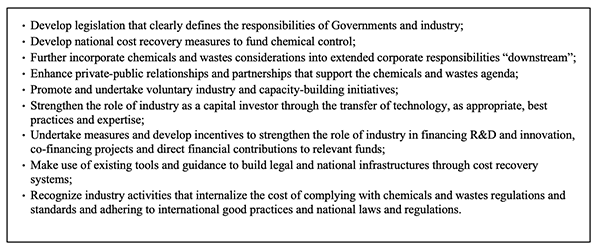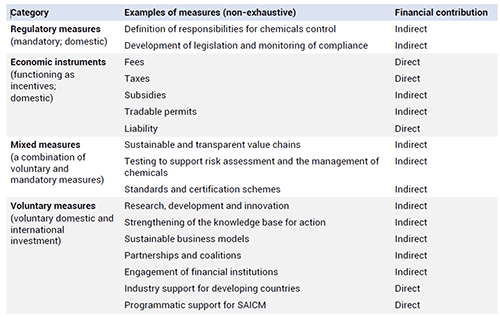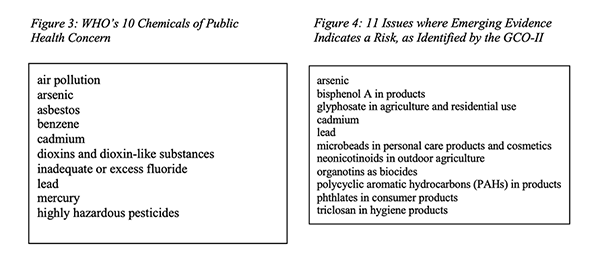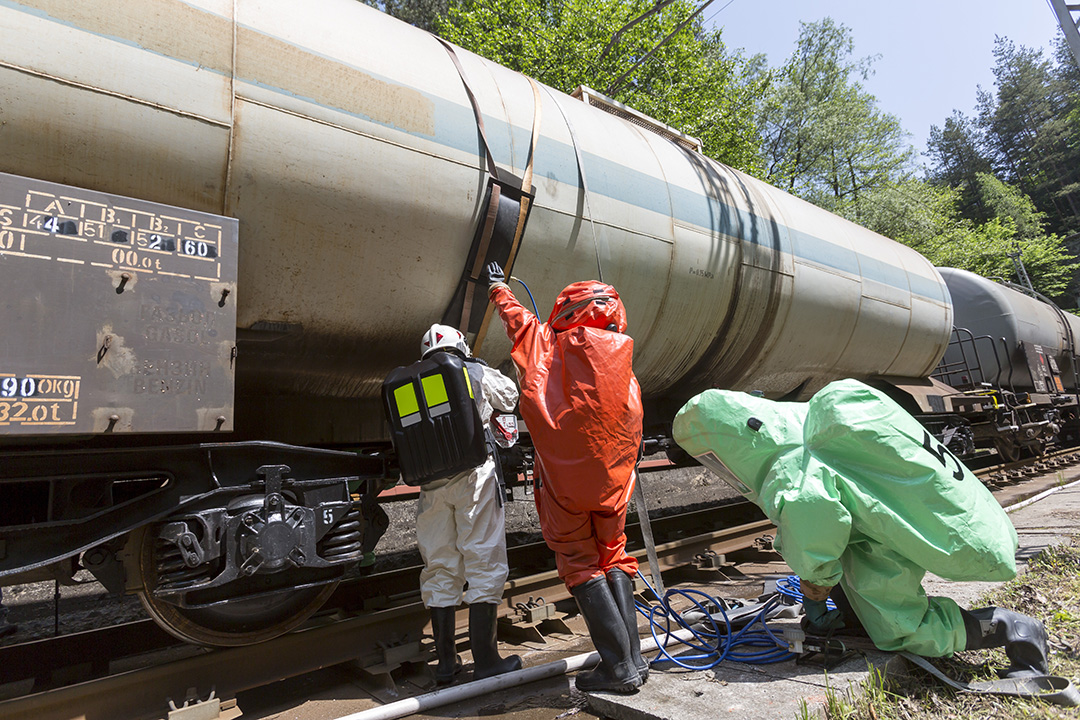Strategic Approach to International Chemicals Management (SAICM) delegates meeting in Bucharest, Romania, from 28 August to 2 September 2022 are tasked with developing a set of recommendations regarding a future global framework or instrument for the sound management of chemicals and waste, for consideration and possible adoption by the fifth session of the International Conference on Chemicals Management (ICCM5) slated for 2023. One of the four chosen topics for discussion in developing these recommendations will be how to ensure adequate funding for such management and what role should industry play. To facilitate the meeting’s discussions on financial resources, the SAICM Secretariat has coordinated the development of a ‘Study on Industry Involvement in the Integrated Approach to Financing the Sound Management of Chemicals and Waste,’ published by the UN Environment Progamme (UNEP).
This Policy Brief outlines the history behind the SAICM agenda, puts in context the issue of financing the sound management of chemicals and waste, and highlights the main findings and proposals from the SAICM study.
The Sound Management of Chemicals and Waste: From Rio to SAICM to a New Framework
The UN Conference on Environment and Development (UNCED or “Rio Summit”) in 1992 suggested possible elements for a global system for chemicals management in Chapter 19 of Agenda 21, but left most of the future work on those elements up to disparate portions of the UN system. The impetus for negotiating and agreeing on a chemicals management approach came ten years later from the 2002 World Summit on Sustainable Development (WSSD), which endorsed achieving, by 2020, the use and production of chemicals in ways that lead to the minimization of significant adverse effects on human health and the environment. The WSSD also called for developing “a strategic approach to international chemicals management” by 2005.
The SAICM was finally launched at the first ICCM in Dubai, United Arab Emirates, in February 2006 as a flexible, voluntary, non-binding, multi-stakeholder, multi-sectoral initiative dedicated to promoting collaboration aimed at achieving the 2020 goal.
As originally conceived, SAICM was due to expire when the fifth and final ICCM convened in 2020. However, by the time ICCM4 convened in September 2015, it became clear that the 2020 goal would not be achieved in most countries, even though the 2020 target was reiterated that same year under Sustainable Development Goal 12 (responsible consumption and production) as target 12.4. ICCM4 decided to launch an intersessional process aimed at designing a post-2020 framework or platform for the sound management of both chemicals and waste for consideration by ICCM5 in 2020.
The COVID-19 pandemic delayed in-person negotiations. The fourth intersessional process meeting, originally scheduled for March 2020, was postponed until 2022, and the fifth ICCM, initially scheduled for 2020, was put off until 2023. To keep momentum going, the ICCM Bureau formed “virtual working groups” on the four components of the draft recommendations targeted by the intersessional process Co-Chairs for discussion, namely: targets, indicators, and milestones; governance and mechanisms to support implementation; issues of concern; and financial considerations. The SAICM Secretariat, in consultation with the Bureau and the intersessional process Co-Chairs, prepared a “compilation of recommendations” from prior intersessional process meetings and the virtual working groups for consideration at the fourth intersessional process meeting in Bucharest.
At this stage, the final outlines of a new framework or platform for the sound management of chemicals and waste remain unclear, including how it would be financed.
The Vexing Issue of Financing the Sound Management of Chemicals and Waste
Agenda 21 was short on details for new or additional means of implementation for carrying out the delineated actions on chemicals and waste. Over the next ten years, work in the area continued mostly in an ad hoc fashion through projects carried out by various UN agencies.
The first two multilateral environment agreements (MEAs) in the chemicals and waste cluster, the Basel Convention on the Control of Transboundary Movements of Hazardous Wastes and their Disposal, whose adoption in 1989 preceded the Rio Summit, and the Rotterdam Convention on the Prior Informed Consent Procedure for Certain Hazardous Chemicals and Pesticides in International Trade, adopted in 1998, did not provide for a financial mechanism to support their implementation, although the African Group repeatedly pushed for adding one to the Rotterdam Convention. Mindful of the greater regulatory burden that the third chemical MEA would entail for many governments, parties designated the Global Environment Facility (GEF) to serve as the financial mechanism of the 2001 Stockholm Convention on Persistent Organic Pollutants (POPs).
By 2009, however, it became apparent that GEF funding was not keeping pace with the financial assistance needs of developing countries and economies in transition trying to meet their commitments under the Convention. A needs assessment submitted to the fourth meeting of the Conference of Parties (COP) to the Stockholm Convention, covering only the initial 12 POPs listed under the Convention and not those listed subsequently, called for nearly USD 5 billion in resources. The estimate contrasted sharply with a GEF report that USD 360 million had been contributed to POPs projects since 2001.
After a contentious COP debate about the need for greater financing, the UNEP Executive Director at the time, Achim Steiner, announced he would launch a consultative process to develop an integrated approach for financing the sound management of chemicals and wastes so it would not become the “poor cousin” of the international environment policy process.
Steiner provided a preview of his proposal for an integrated approach to ICCM3 in September 2012. His proposal focused on three components:
- mainstreaming the sound management of chemicals and wastes into development planning;
- industry involvement, including a non-exhaustive list of activities that could be undertaken; and
- dedicated external financing.
Figure 1: Non-Exhaustive List of Activities for Industry Involvement under the Integrated Approach, as approved by UNEP Governing Council Decision 27/12

The Executive Director’s finalized proposal, largely unchanged from the version previewed at ICCM3, was approved by the UNEP Governing Council in February 2013, and again by the first session of the UN Environment Assembly (UNEA-1) in June 2014. The integrated approach then became the de facto baseline of any future discussion in global forums on financing for chemicals and waste management. UNEA-1 also established UNEP’s Special Programme on the Institutional Strengthening at the national level for the implementation of the Basel, Stockholm, and Rotterdam (BRS) conventions, the Minamata Convention, and SAICM (“Special Programme”).
Delivering on the mandate to provide an evaluation of the integrated approach no later than six years after its approval, and to inform the discussions of ICCM5, in March 2019, the UNEP Executive Director submitted to UNEA-4 an evaluation, noting some improvement in the dedicated external financing component, particularly in greater GEF funding and the establishment of the Special Programme. He also reported there was insufficient information to determine to what degree mainstreaming is taking place and, apart from industry’s EUR 150,000 annual contribution to the SAICM budget from 2013 to 2019 (in 2022 this was doubled to EUR 300,000), little information was available on industry involvement. The report identified the challenges for the industry involvement component as:
- a lack of clarity or agreement on what should count or be sought as industry contributions;
- no tracking of industry activities and financial flows; and
- a poor understanding of the mechanisms for industry participation at the national level.
SAICM’s Struggle with Financing Its Agenda
One of the sticking points in the Dubai negotiations on creating SAICM was financing. Developing countries wanted a dedicated financial mechanism for SAICM implementation, possibly involving an international financial institution such as the GEF. Some developed nations opposed any reference to finance from international institutions. They also opposed any reference to the “polluter pays principle,” even though those in favor pointed out that the principle had been endorsed in UNCED’s Rio Declaration as Principle 16.
A compromise was reached to strike all references to the polluter pays principle, to create a time-bound Quick Start Programme, funded by voluntary national contributions for five years, aimed narrowly at supporting initial capacity-building activities for the implementation of SAICM objectives, and to invite industry to consider providing resources, including in-kind contributions, for the implementation of SAICM objectives.
Mindful that the Quick Start Programme was winding down, in September 2012 delegates discussed long-term financing options for SAICM, deciding to extend the life of the Programme until ICCM4. They also welcomed the preview provided by the UNEP Executive Director of his draft proposal for an integrated approach. In Resolution III/1, ICCM3 called for the proposal to be finalized and underscored the relevance of the approach for SAICM.
In September 2015, delegates formally welcomed the finalized integrated approach, while underscoring that all three elements (mainstreaming, industry involvement, and dedicated external financing) “are mutually reinforcing and are all important.” ICCM4 also adopted SAICM’s Overall Orientation and Guidance for achieving the 2020 sound management goal. The document echoed the integrated approach’s calls for countries to develop policies defining the responsibilities of industry and national administrations, and to “develop financial solutions and appropriate mechanisms and economic instruments including cost recovery systems.”
Early in the intersessional process to define a new framework or instrument for the sound management of chemicals and waste after 2020, many delegates made it clear they would judge the outcome of the process by the financing linked to its implementation. Preliminary findings of an independent evaluation of SAICM 2006-2015, delivered at the third session of the ICCM’s Open-ended Working Group (OEWG3) in April 2019, indicated that many stakeholders considered insufficient financial flows a key reason SAICM did not meet the 2020 goal and that industry was not yet fulfilling its part in the integrated approach to financing.
As a result, the Latin American and Caribbean Group (GRULAC), the African Group, Azerbaijan, Cambodia, Indonesia, Iran, Oman, Thailand, and Tuvalu offered a proposal at OEWG3 for the creation of a standalone International Fund to implement the sound management of chemicals and waste. According to their proposal, the Fund would be accessible to all stakeholders, but would target support to developing countries in the form of grants, guarantees, and loans. The Fund, they suggested, could be financed through: reallocation of existing international financing; contributions from governments, development banks, philanthropies, venture capital, and other stakeholders; and an “agreed levy” on chemicals.
At the third intersessional process meeting in October 2019, these nations reiterated their support for a standalone fund, and many developing countries also voiced their support for an idea floated by civil society stakeholders for “globally coordinated” national taxes on the production of chemical feedstocks whose revenues would be earmarked for contribution to the proposed International Fund.
What the Study Proposes
The SAICM ‘Study on Industry Involvement in the Integrated Approach to Financing the Sound Management of Chemicals and Waste’ “does not provide definitive answers” to the challenges identified in the industry involvement component of the integrated approach. However, the study does offer many recommendations for SAICM stakeholders to consider in their preparations for ICCM5.
Figure 2: Suggested classification of activities for industry involvement and the related contribution in terms of financing

Source: SAICM (2022) Study on Industry Involvement in the Integrated Approach to Financing the Sound Management of Chemicals and Waste
Define what industrial involvement entails: The study recommends that stakeholders first articulate which activities are needed to implement the industry involvement component of the integrated approach to financing, and identify the relevant stakeholders involved for each. The report suggests a typology for such activities (see figure 2), and details how each might be applied to the sound management of chemicals and waste. The study also recommends designing, with the involvement of all stakeholders, model regulations, training, and toolkits for each measure.
Actively engage all actors in the value chain: The report recommends developing a strategy for outreach to the private sector all along the chemical value chain, to identify opportunities for increasing financial and in-kind contributions from industry associations.
Promote partnerships: The study suggests creating more opportunities for partnerships with industry through the creation of a capacity-building clearinghouse, marketplace or global commitment platform for the development, implementation, monitoring, and communication of partnerships and other voluntary commitments, akin to the many such partnerships that have sprung up in the climate sector.
Track it: The study posits that it is difficult to assess needs and gaps without data about what is being done regarding industry involvement. It suggests that the ICCM consider asking UNEP and relevant members of the Inter-Organization Programme for the Sound Management of Chemicals (IOMC) to conduct an in-depth assessment of what data is already collected or could be collected through existing mechanisms. The IOMC is the coordinating body for cooperation on chemicals issues among UN bodies, the Organisation for Economic Co-operation and Development (OECD), and the World Bank.
The report suggests initially setting three indicators:
- funds collected through economic instruments such as taxes or fees;
- costs faced by industry in complying with regulations; and
- funds channeled through voluntary measures.
It recommends that all entities involved enhance cooperation with a view to harmonizing methodologies for data collection. The study further suggests that once indicators are further refined and an outreach strategy to involve the private sector is developed, a more comprehensive reporting mechanism be developed to measure financial inputs and performance.
Encourage corporate disclosure: The study suggests developing recommendations for a “comprehensive and harmonized set” of chemicals-related sustainability disclosures from companies that could help guide investment and financing decisions.
Expedite fund mobilization: The study suggests that the ICCM consider asking UNEP, IOMC participating organizations, and/or the secretariat of the new framework/instrument to form a technical expert group tasked with expediting the mobilization of funds for developing countries, with a focus on innovative forms of financing that primarily involve the private and financial sectors.
Specify expected actions from industry: The study suggests several actions that the ICCM could consider asking of industry, including:
- adopt action plans and road maps for achieving the sound management of chemicals and waste;
- help finance the costs of, inter alia, national chemical management schemes, data generation, hazard communications, risk assessments, and implementation of pollution release and transfer registers;
- wean out harmful subsidies;
- support developing countries through GEF co-financing and the Special Programme, and through capacity building and in-kind contributions; and
- ensure that health and safety information about toxic substances is never confidential and disclose information through voluntary initiatives across the product life cycle.
Specify expected actions from governments: The study recommends that to facilitate industry involvement, the ICCM consider asking governments to, inter alia:
- establish a national coordination mechanism to enable dialogue between regulators and industry;
- define, through legislation, the responsibilities of the public and private sectors in helping increase funding for chemicals control;
- conduct national economic valuations of the cost of unsound management of chemicals and waste, building on the work of UNEP;
- assess existing economic instruments and empower finance ministries to carry out reforms necessary to: a) introduce cost recovery fees for chemicals control whose revenue is earmarked for chemicals registration, inspection and licensing; b) develop extended producer responsibility schemes; c) introduce deposit-refund systems to incentivize the return of end-of-life products or materials; d) introduce taxes earmarked for the sound management of chemicals and waste on substances such as flame retardants, pesticides, fertilizers, and chlorinated solvents; and e) redesign, reduce or redirect subsidies that incentivize the use of substances of concern;
- mandate requirements for information disclosure and labeling of hazardous chemicals;
- require pre- and post-market risk assessments, while allowing for the use of risk assessments completed by other jurisdictions when appropriate, and exploring regional cooperation to enable a pooling of resources for risk assessment; and
- articulate due diligence duties across the supply chain of chemicals to oblige suppliers and distributors to adhere to standards.
Specify expected actions from the IOMC: The study recommends the ICCM consider asking UNEA and/or the governing bodies of the IOMC participating organizations to mandate the IOMC to:
- comprehensively analyze the economic costs of unsound management of chemicals and waste, similar to the influential Stern Review conducted for climate change;
- promote the use of the UNEP Guidance on the Development of Legal and Institutional Infrastructures for Sound Management of Chemicals and Measures for Recovering Costs of National Administration through UNEP regional offices, Basel and Stockholm Conventions regional centers, and other relevant UN bodies and funds;
- develop an independent, publicly accessible global inventory of all chemicals on the market;
- engage with business and industry as partners with a view to establishing high-impact partnerships on issues of concern, such as the World Health Organization’s (WHO) “10 issues of public health concern” (see figure 3) or the 11 “issues where emerging evidence indicates a risk” identified by the Second Global Chemicals Outlook (GCO-II) (see figure 4), in response to a mandate from UNEA;

- develop a methodology, building on existing work, for a chemical footprint assessment; and
- promote harmonization of risk assessment methods and procedures, to increase efficiency for industry, building on existing initiatives such as OECD’s Mutual Acceptance of Data system, which saved nearly EUR 40 million in testing costs for new industrial chemicals introduced in 2018.
The study and its recommendations are due to get their initial airing at the upcoming fourth intersessional process meeting in Bucharest. The study comprehensively analyzes all the problems with the industry involvement component of the integrated approach to financing identified in both the UNEP Executive Director’s 2019 evaluation and in the independent evaluation of SAICM 2006-2015, and proposes concrete steps to address them. It remains to be seen, however, whether the tensions between proponents and skeptics of a standalone fund can be resolved and whether agreement on better defining industry involvement in the financing of chemicals and waste management can be reached.
* * *
This document has been developed within the framework of the Global Environment Facility (GEF) project ID: 9771 on Global Best Practices on Emerging Chemical Policy Issues of Concern under the Strategic Approach to International Chemicals Management (SAICM). This project is funded by the GEF, implemented by UNEP, and executed by the SAICM Secretariat. The International Institute for Sustainable Development acknowledges the financial contribution of the GEF to the development of this policy brief.
This Policy Brief is the first in a series featuring cross-cutting topics relating to the sound management of chemicals and waste. It was written by Keith Ripley, Earth Negotiations Bulletin (ENB) team leader and writer. The series editor is Elena Kosolapova, Senior Policy Advisor, Tracking Progress Program, IISD.


